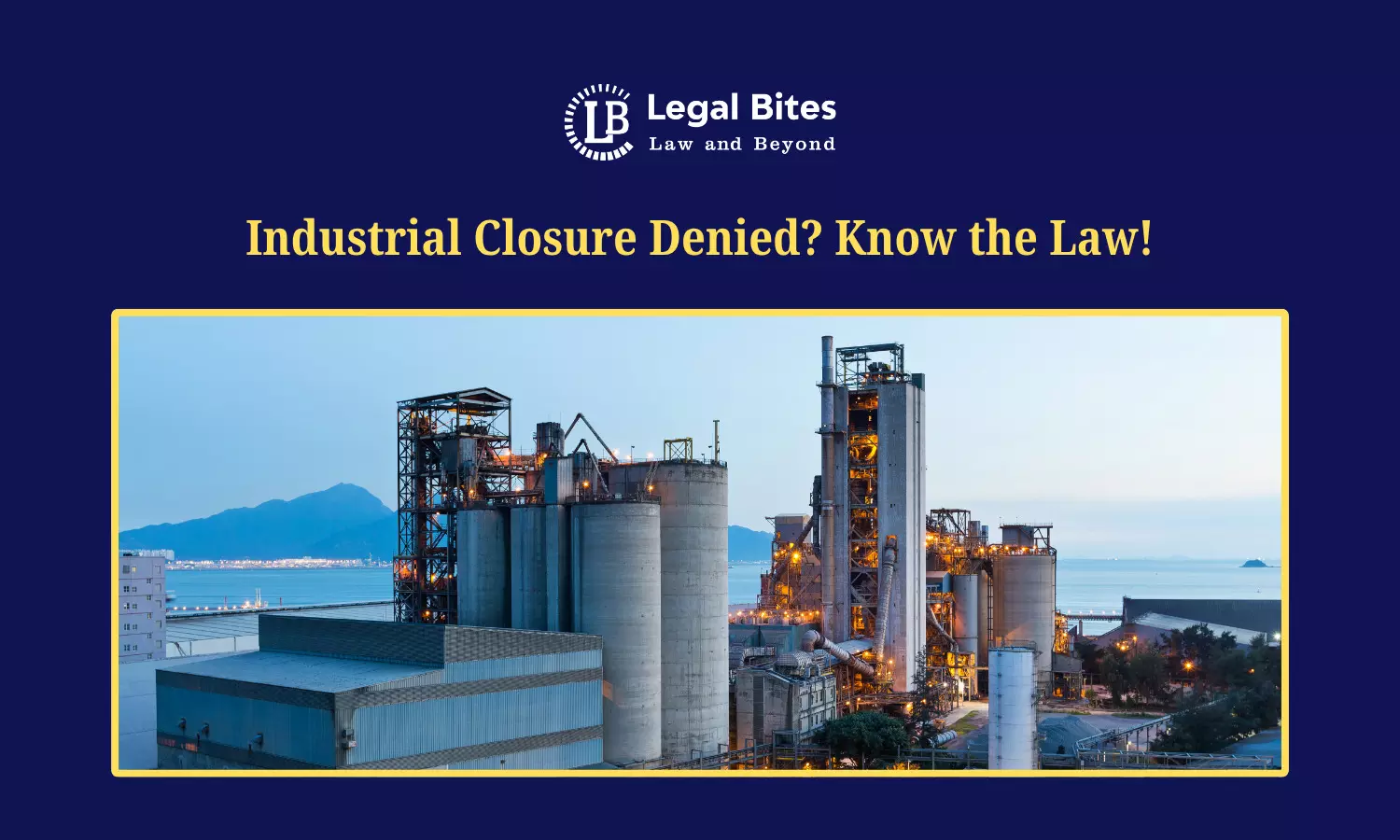What Constitutes a Valid Order of Refusal for Industrial Closure Under the Industrial Disputes Act?
With legal analysis and case law, this article guides employers, workers, and lawyers through the complex process of industrial closure under Indian labour law.

Industrial closure is a complex issue that directly impacts not only the business but also the livelihood of employees and the economic equilibrium of society. The Industrial Disputes Act, 1947, especially Section 25-O, provides the legal framework governing the procedure for closure of industrial undertakings.
Recent judicial scrutiny, particularly in Harinagar Sugar Mills Ltd. (Biscuit Division) v. State of Maharashtra & Ors. (2025 INSC 801), has sharpened the contours of what constitutes a valid refusal order by the appropriate government. This article explores the statutory requirements, interpretive jurisprudence, and the tests evolved for the validity of a refusal order under Indian labour laws.
Legal Framework under Section 25-O of the Industrial Disputes Act, 1947
Section 25-O provides a mandatory procedure for the closure of an industrial undertaking employing 100 or more workmen. The key requirements are:
- Prior Permission (Sub-section 1): An employer intending to close down must apply for permission at least 90 days before the intended date of closure.
- Reasoned Order (Sub-section 2): The appropriate government must conduct an enquiry, give an opportunity of hearing to stakeholders, and pass a reasoned order.
- Deemed Approval (Sub-section 3): If no order is communicated within 60 days of application, closure is deemed to be permitted.
A valid refusal order must satisfy both substantive and procedural mandates under these sub-sections.
Supreme Court Ruling in Harinagar Sugar Mills Case: The Core Dispute
The appellants, Harinagar Sugar Mills Ltd. (HSML), had been manufacturing biscuits exclusively for Britannia Industries Ltd. (BIL) for over three decades under Job Work Agreements. BIL terminated the agreement in May 2019, effective from November 2019. Faced with a loss of business, HSML applied for closure under Section 25-O on August 28, 2019, notifying the termination of 178 workers.
The State of Maharashtra responded on September 25, 2019, via a letter from the Deputy Secretary stating that the application lacked adequate reasons and requested resubmission. No formal rejection order was passed within 60 days.
Issue
Did the September 25 letter constitute a valid refusal under Section 25-O(2), or had the closure permission been deemed granted under Section 25-O(3)?
Judicial Analysis: Validity of Refusal Order
1) Who is the ‘Appropriate Government’?
As per Section 25-O, only the “appropriate government” may grant or refuse closure. In this case:
- The Minister for Labour was the notified authority.
- The letter of refusal came from the Deputy Secretary.
- No official notification under Section 39 delegated powers to the Deputy Secretary.
A refusal order by an unauthorised officer is non-est in law. Endorsement of file notings or internal departmental communications is insufficient to constitute a valid governmental order. Hence, the September 25 letter was ultra vires.
- Bachhittar Singh v. State of Punjab, AIR 1963 SC 395
- Sethi Auto Services v. DDA, (2009) 1 SCC 180
2) Was the Order Reasoned and Communicated Properly?
Section 25-O(2) mandates that refusal must be:
- A formal “order”
- Containing “reasons recorded in writing”
- Communicated to both employer and workmen
In this case:
- The letter dated September 25 merely asked for further justification.
- It lacked reasons on merits and wasn’t addressed to workers.
- There was no hearing or enquiry as mandated.
Supreme Court’s Finding:
The so-called “refusal” failed the test of a reasoned administrative order. Without application of mind and statutory compliance, it could not interrupt the deeming provision under Section 25-O(3).
3) Nature of the Deeming Provision: Strictly Time-Bound
The Supreme Court reaffirmed that:
- Section 25-O(3) provides for deemed approval if no order is passed within 60 days.
- The time frame is mandatory, not directory.
- Authorities cannot circumvent this by seeking clarifications or repeated “resubmissions.”
Judicial Reasoning:
Permitting continuous back-and-forth would defeat the very purpose of the 60-day statutory limit, rendering the deeming provision redundant. Courts must give effect to legislative intent that protects employers from administrative inertia.
Right to Close: Constitutional Protection under Article 19(1)(g)
Closure of business is part of the right to trade under Article 19(1)(g), though subject to reasonable restrictions under Article 19(6). In Excel Wear v. Union of India (1978) 4 SCC 224, the earlier version of Section 25-O (without time limits) was struck down as unconstitutional.
The amended Section 25-O was upheld in Orissa Textile & Steel Ltd. v. State of Orissa, (2002) 2 SCC 578, as it:
- Introduced timelines
- Required a hearing
- Imposed checks against arbitrary decisions
Thus, the closure right, while not absolute, is fundamental and subject only to justifiable regulatory oversight.
What Constitutes a Valid Refusal Order? Legal Ingredients
From statutory language and judicial precedent, a valid refusal order must include the following components:
| Requirement | Explanation |
|---|---|
| Jurisdictional Validity | Must be passed by the competent “appropriate Government” or duly delegated authority |
| Procedural Compliance | Must follow an enquiry and give hearing to employer, employees, and stakeholders |
| Reasoned Order | Must state “genuineness” and “adequacy” of reasons for refusal |
| Timely Communication | Must be issued and served within 60 days of the closure application |
| Non-Arbitrariness | Must not rely on assumptions or internal notings without independent reasoning |
| Opportunity to Represent | Must ensure procedural fairness, including participation of workmen’s unions |
Highlights of the Judgment
A Bench of Justices Sanjay Karol and Prashant Kumar Mishra observed:
"The sum and substance are that Article 19(1)(g) includes the right to shut down a business but is, of course, subject to reasonable restrictions. This interplay of Article 19(1)(g) and Section 25-O of the Act engaged in the attention of a Constitution Bench of this Court in Excel Wear (supra), when it was cast with considering the constitutionality of Section 25-O as it then stood.
It has subsequently been amended, challenged before this Court and upheld in Orissa Textile and Steel (supra), which we will discuss further ahead."
Implications of the Judgment
The Supreme Court’s decision in Harinagar Sugar Mills Ltd. has far-reaching implications:
- Administrative Accountability: Government cannot delay closure decisions indefinitely by procedural subterfuge.
- Strengthened Employer Rights: Employers are entitled to plan business exits without being indefinitely held hostage by bureaucratic inaction.
- Employee Protection Balanced: While the law protects workers, it does not do so at the cost of infringing upon fundamental business freedoms.
- Policy Clarity Required: States must notify clear delegation orders under Section 39 to avoid procedural illegality in such cases.
Conclusion
A valid order of refusal under Section 25-O of the Industrial Disputes Act must emanate from a competent authority, be procedurally robust, reasoned, and timely. The Supreme Court’s ruling in Harinagar Sugar Mills Ltd. v. State of Maharashtra reaffirms that industrial closure is a serious legal act—but not an unqualified veto power of the state. The decision promotes constitutional fairness and enforces legislative discipline in closure proceedings, thus serving both employer and employee interests within the rule of law.

